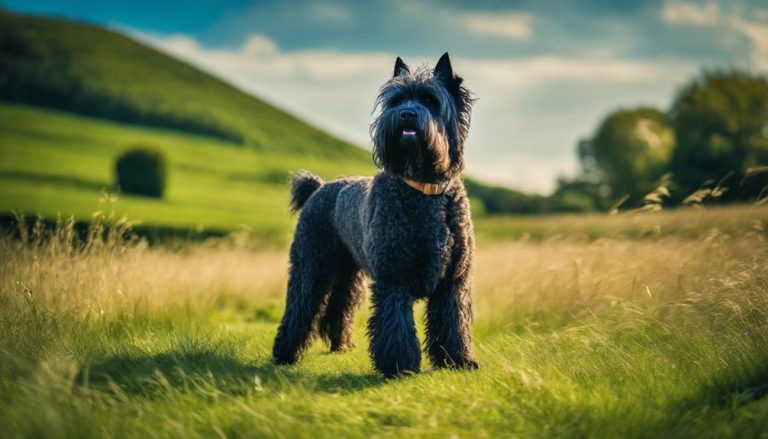Bouvier Des Flandres: Dog Breed
The Bouvier Des Flandres hails from the Flanders region, which spans Belgium and Northern France. Known for its robust and versatile nature, this breed was initially bred by monks in the 1600s to assist with cattle herding. Its skills, however, proved invaluable during World War I, where it demonstrated exceptional courage. Today, the Bouvier Des Flandres excels in a variety of roles from farm work to agility, obedience, and tracking. This is thanks to its strong and adaptable character.
To keep this breed healthy and happy, they require ample space, consistent grooming, and plenty of exercise. Paying attention to their health, especially conditions like hip dysplasia, and their nutritional needs is crucial for their well-being. Understanding these aspects can greatly improve the quality of life for these loyal protectors.
Key Takeaways
- Originating from Flanders, the Bouvier Des Flandres excels in herding.
- Needs daily exercise to stay healthy and happy.
- Grooming keeps their coat in top condition, avoiding skin problems.
Quick Facts
The Bouvier des Flandres, hailing from Belgium, stands out with its impressive size, reaching heights of 24-27 inches and weighing between 60-110 pounds. Its unique look comes from a dense, shaggy coat that’s built to withstand bad weather. This breed’s sturdy frame and strong muscles show its history in farm work, herding, and even as a guard dog. Its thick coat acts as armor against the elements, making it perfect for outdoor tasks.
Being part of the Working group, the Bouvier des Flandres thrives on a variety of jobs. From managing livestock to pulling carts and protecting property, this dog does it all with intelligence and a calm demeanor. Their wide range of skills, along with their smart and reliable nature, makes them excellent working dogs. Their ability to adapt and tough it out in different environments keeps them valued and respected in roles that go back generations.
Overview
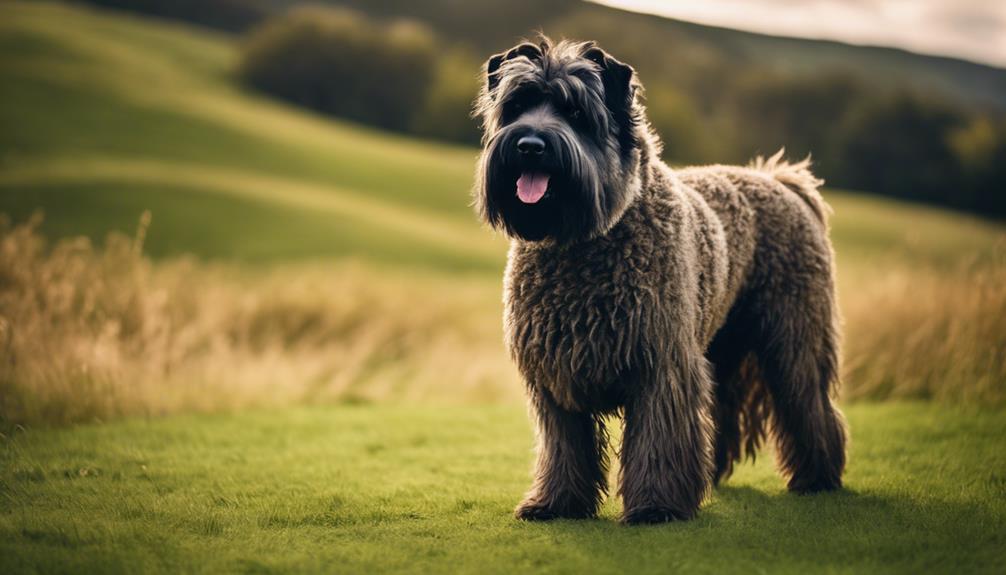
The Bouvier des Flandres is a strong and multi-skilled dog breed that originally comes from Flanders, Belgium. It was bred in the 1600s to perform various farm duties such as herding and guarding. This breed was the result of mixing local farm dogs with larger breeds like the Irish wolfhound and Scottish deerhound to achieve a dog that was big, strong, and smart enough for farm work.
The Bouvier des Flandres has proven its worth beyond herding, excelling in tasks that require bravery, resilience, and versatility, including pulling carts and participating in search-and-rescue missions.
In the 20th century, the breed faced the threat of extinction twice, but a French-Belgian committee formed in 1936 to standardize the breed, which helped ensure its survival and continued growth. Nowadays, the Bouvier des Flandres shines in dog sports such as agility, obedience, and tracking, thanks to its intelligence and physical prowess.
However, future owners should consider the breed’s risk for certain health issues, like hip dysplasia, eye conditions including glaucoma and cataracts, and bloat. Regular check-ups and care are crucial for their health.
Versatile Farm Dog Origins
Originating from the Flanders region of Belgium and Northern France, the Bouvier des Flandres was carefully developed by monks at the Ter Duinen monastery. Initially bred for herding cattle, this breed quickly proved its worth by showing off its intelligence and protective instincts, making it a well-rounded farm dog.
| Feature | Impact |
|---|---|
| Intelligence | Makes training for different roles easier |
| Strength | Allows for efficient management of large livestock |
| Versatility | Can take on multiple farm tasks beyond just herding |
| Protective Instinct | Keeps both the herd and home safe |
The early development of the Bouvier des Flandres highlighted its incredible ability to adapt and work hard, qualities that were almost lost when the breed nearly went extinct. Thankfully, dedicated breed enthusiasts ensured its survival, showcasing the breed’s resilience and ongoing importance. Today, the Bouvier des Flandres continues to thrive as an adaptable farm dog, embodying the spirit of the Flanders region with its rich heritage and functional versatility.
Belgian War Service
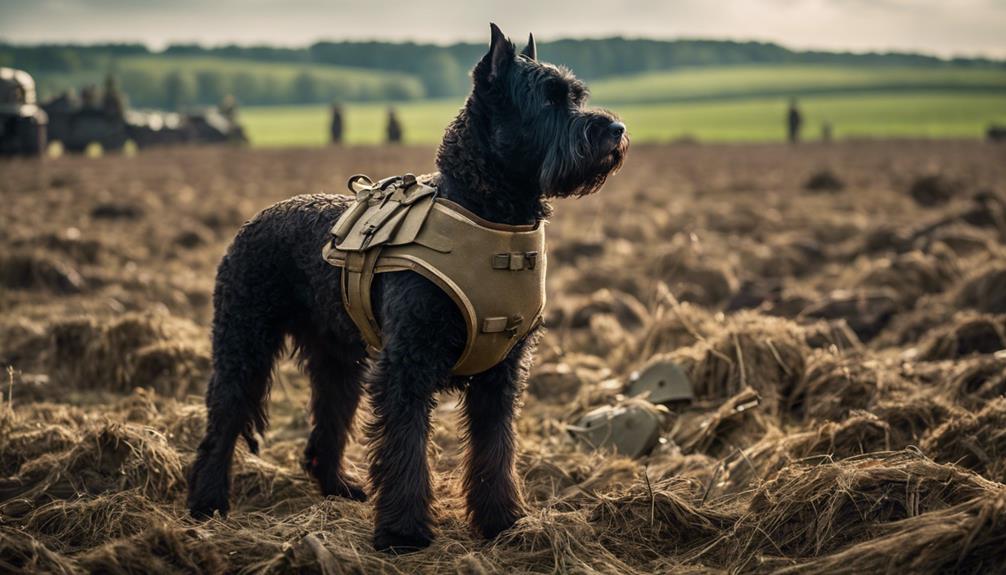
The Bouvier des Flandres, originally bred for farm work, showed incredible versatility and bravery during World War I, taking on roles that went well beyond their initial purpose. Their contribution to the Belgian War Service was significant due to their smarts, loyalty, and strong build. This section looks into the diverse ways the Bouvier des Flandres supported war efforts, highlighting their importance, the specific training they received, and their achievements in service.
These dogs were crucial in wartime situations. They underwent training that was designed to make the most of their natural abilities. The Bouvier des Flandres made notable contributions across various military operations. Their work during the war has left a lasting mark on military history.
War Role Significance
During both World War I and II, the Bouvier des Flandres played a vital role. This breed excelled in Belgian War Service, performing tasks like message delivery, rescuing soldiers, and conducting surveillance. Their intelligence, loyalty, and adaptability were unmatched, making them crucial in various military operations.
The Bouvier des Flandres was known for its calm yet brave nature, making it perfect for both war and peace-time activities. These dogs were not just helpful during the wars; their skills and dedication left a lasting impact. They showed incredible trainability and loyalty, which are celebrated even today.
Military Training Methods
During World War I, the Bouvier des Flandres played a vital role in the Belgian military, thanks to their comprehensive training. This breed was trained for obedience, agility, and to follow specific commands effectively in stressful situations. The training focused on utilizing their natural traits of intelligence, loyalty, and resilience.
These dogs were equipped to tackle difficult terrains, proving their quick and accurate response to various commands. The rigorous training regimen enhanced both their physical and mental abilities, making them reliable multifunctional working dogs. As a result, the Bouvier des Flandres became highly adaptable, ready for the challenges of wartime service.
Notable War Contributions
In World War I, the Bouvier des Flandres dogs became heroes in Belgium for their incredible work. These dogs were not just pets; they were lifesavers. They braved dangerous conditions to rescue soldiers and carry vital messages through enemy territory. Their intelligence and loyalty were unmatched, making them perfect for many roles during the war.
Bouviers had a knack for navigating through tough situations, showing bravery that earned them a special place in military history. Their ability to learn quickly and work hard made them invaluable. They took on tasks that were critical to the war effort, proving their worth time and again. This breed’s contribution to the Belgian War Service highlights their remarkable abilities and the key role they played in supporting troops.
Large Breed
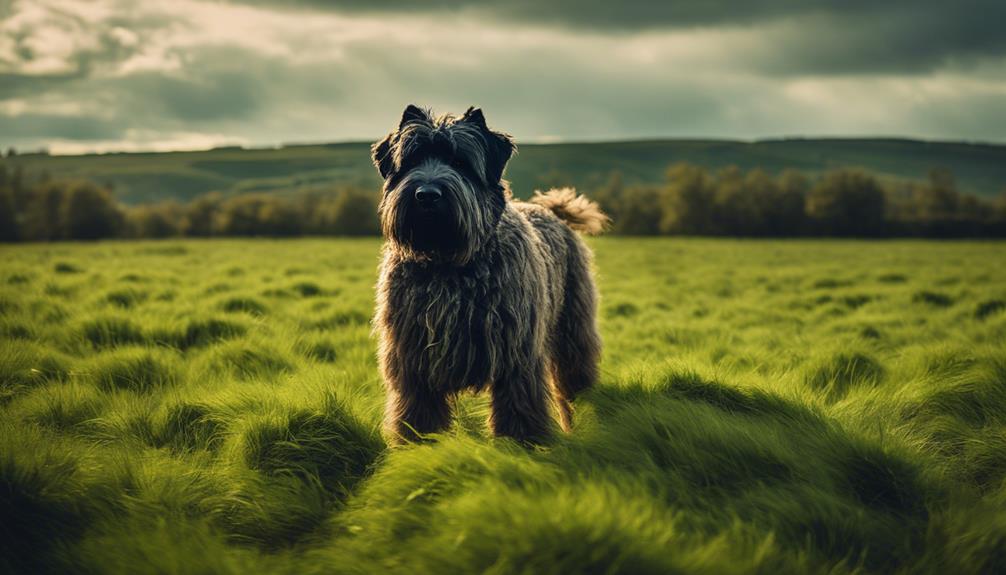
The Bouvier des Flandres is a large breed that needs special care to stay healthy and happy. This breed requires certain things because of its size and strength, which are vital for its long-term well-being and life quality. Knowing these requirements helps both new and existing owners give their dogs the best possible care.
Suitable Living Conditions
This dog needs enough room to move around comfortably. A spacious home with a large yard is ideal, as it allows them to exercise and explore safely.
Exercise Requirements
Regular physical activity is crucial for this breed. A mix of walks, playtime, and training exercises will keep them physically fit and mentally stimulated.
Health Care
Routine veterinary check-ups are important to catch any potential health issues early. A diet suited to their size and energy levels, along with preventative care for common large breed problems, ensures they stay in top shape.
Grooming Needs
Their thick coat requires regular grooming to prevent matting and keep their skin healthy. Brushing a few times a week and professional grooming every few months will keep their coat looking its best.
Understanding these key care points is essential for anyone looking to bring a Bouvier des Flandres into their life. Proper care ensures these gentle giants lead a fulfilled and joyful life.
Ideal Living Space
Bouvier des Flandres dogs thrive in environments that give them plenty of room due to their large size and need for activity. These dogs are not well-suited for small apartments because they need more space to move and play.
For a Bouvier, living in a suburban or country home is perfect. These areas provide vast spaces for them to exercise and play without bothering neighbors or harming the environment. It’s important to pick a place where they can stay active and have lots of room to roam.
This kind of environment is crucial for their health and happiness, showing how vital the right living space is for their growth and overall well-being.
Exercise Needs
To keep a Bouvier des Flandres in top shape and happy, they need about 40 minutes of exercise every day. This is crucial for both their physical health and their mental state. Being a high-energy breed, regular workouts are necessary to keep them from getting bored and acting out.
Activities like fast-paced walks, runs, or playful games such as fetch are great ways to keep them active. They also thrive in organized dog sports like agility, which keeps them fit, prevents weight gain, and builds muscle. More than just physical benefits, these activities strengthen the bond between the dog and its owner, ensuring a peaceful coexistence.
Including specific examples, for those looking to dive into dog sports, agility training can be a fantastic way to engage your Bouvier des Flandres. It’s not just about the physical workout; it’s about working together, which builds trust and understanding.
Health Considerations
Large dog breeds like the Bouvier des Flandres often face health issues such as hip dysplasia, eye problems including cataracts and glaucoma, and bloat. These conditions require close attention and consistent visits to the vet. Health screenings are crucial for early detection and management of these issues.
Given their history of coming close to extinction, maintaining the health of the Bouvier des Flandres through careful breeding and following vet advice is vital. Regular check-ups, proper care, and preventive actions are key to dealing with their specific health challenges, especially hip dysplasia. This approach helps ensure these dogs lead healthy, happy lives.
Grooming Essentials
Proper grooming is crucial for the health and happiness of the Bouvier des Flandres. This involves a strict routine of brushing once a week and getting professional trims periodically to maintain its unique double coat and avoid skin problems.
Weekly brushing not only keeps their coat healthy by spreading natural oils but also minimizes shedding. The Bouvier des Flandres’ dense double coat can easily mat if not cared for properly, so regular grooming and professional cuts a few times a year are key to keeping them looking their best.
Grooming sessions are also the perfect time to check your Bouvier des Flandres for any skin issues, parasites, or injuries. Catching these problems early on ensures your dog stays healthy and comfortable. Remember, keeping up with these grooming tasks is not just about appearance; it’s about your pet’s overall wellbeing.
Socialization Tips
Starting socialization early is crucial for the Bouvier des Flandres, a breed known for its size and strength. This process helps them become friendly and well-behaved around people and other animals. It’s about getting your puppy used to different places, noises, and situations to build their confidence. They should meet various people, including kids, adults, and other pets, to avoid fear or aggressive behaviors.
Consistent and early efforts in socializing your Bouvier are the key to preventing bad habits. This approach makes sure your dog grows up to be a friendly and balanced adult. Socializing your Bouvier des Flandres properly is essential for a happy and well-adjusted dog.
Loyal and Protective Nature
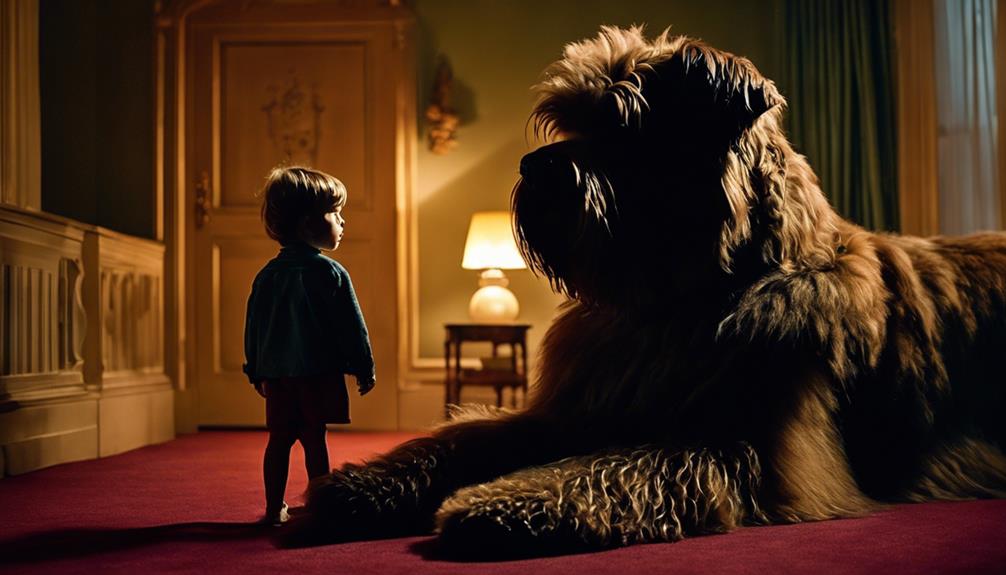
The Bouvier des Flandres is known for its fierce loyalty and protective instincts. This dog breed is naturally inclined to keep their loved ones and home safe, thanks to their sharp intelligence. To fully develop these protective qualities, it’s important to focus on a few critical areas:
- Guarding Abilities: Their natural instinct to guard must be properly managed.
- Strong Family Connections: They form close bonds with their family, making them vigilant protectors.
- Effective Obedience Training: Training helps them understand how to control their protective instincts.
- Essential Socialization: Early socialization is crucial to prevent overprotectiveness.
Guarding Instincts
Bouvier des Flandres dogs naturally guard their families with unwavering loyalty and a protective stance, making them standout guard dogs. Their background in working roles, including livestock and property protection, has equipped them with a keen alertness and a cautious approach towards strangers, highlighting their protective traits.
This breed’s dedication and instinct to protect can be sharpened with early socialization to ensure they guard effectively. They are gentle with children in their own family but remain alert, ready to protect against any threat. This makes them dependable guardians in various environments.
Family Bonds
Bouvier des Flandres dogs are known for their deep bonds and protective nature towards their human families. They are both loyal companions and vigilant guardians. With their intelligence and ability to learn quickly, they easily become integral parts of the family through effective training and socialization.
Their calm demeanor, combined with a natural instinct to protect, makes them perfect family pets, always ready to show their loyalty and love. This breed truly stands out as the ideal protective friend, offering both security and affection.
Training for Obedience
Bouvier des Flandres dogs stand out due to their loyalty and protective nature, making them great for obedience training. They are smart and deeply committed to their families, thriving in environments where they can learn and grow. Starting them off with socialization early on is critical, as it helps them behave well during training sessions. These dogs have a natural ability to follow commands, which improves significantly with patient and systematic training.
Involving Bouviers in training helps direct their protective instincts in a constructive way, making them reliable protectors and friends. Their eagerness to learn and perform well in training competitions shows that they are capable of reaching high levels of obedience with the right training approach.
Socialization Needs
The Bouvier des Flandres breed is known for its loyalty and protective instincts. To make sure these dogs grow up to be confident and behave well around new people and places, they need to start socializing early.
This breed naturally wants to protect its family, so it’s important to show them a variety of situations. This helps them understand what’s normal and what might be a real threat, preventing them from becoming too wary or aggressive without reason.
Introducing them to different people, animals, and environments in a controlled way helps their protective nature work in positive ways. As a result, a well-socialized Bouvier turns into a calm, thoughtful companion. They fit well into family life and public areas, maintaining their role as reliable protectors without being overly suspicious of people who pose no danger.
Alertness to Threats
Understanding the social needs of the Bouvier des Flandres reveals their strong alertness to threats, which comes from their loyalty and protective nature. These dogs are naturally inclined to safeguard their families and homes, making them excellent watchdogs.
Their intelligence and strong protective instincts allow them to quickly recognize and act upon potential dangers. The Bouvier des Flandres’ loyalty keeps them always on the lookout, ready to protect against any harm in their surroundings. This protective trait is core to their behavior, establishing them as dependable guardians.
They are skilled at warning their owners about possible risks, proving their essential role in ensuring safety and security.
Hip Dysplasia Risks
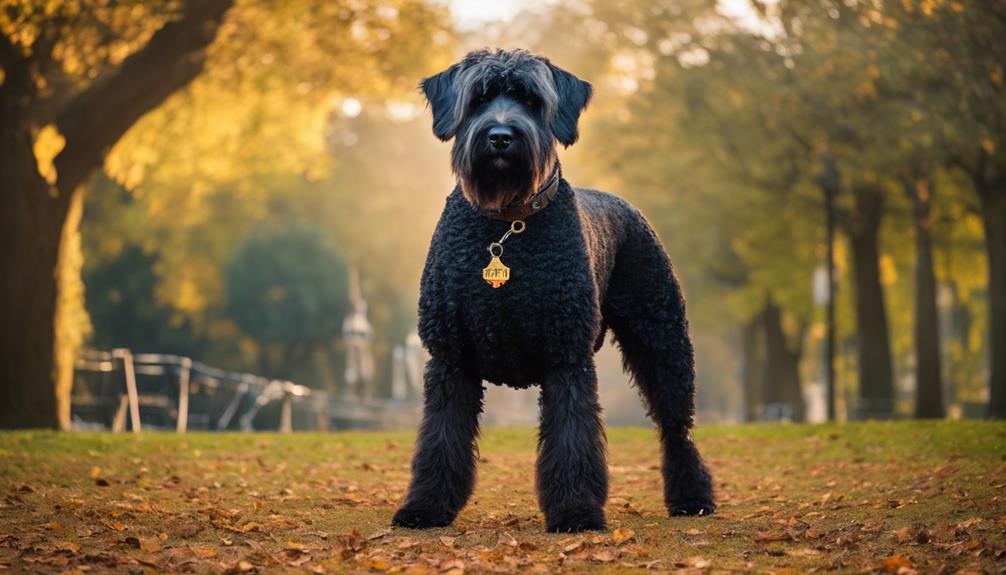
The Bouvier des Flandres is a strong and devoted dog breed that often struggles with hip dysplasia. This genetic condition can affect the dog’s hip joint, making early management crucial to ensure they live a happy and healthy life. Managing hip dysplasia involves a comprehensive plan that includes early detection, preventive steps, and various treatment methods. This approach helps reduce the condition’s effects on the dog’s wellbeing and lifespan.
Key to fighting hip dysplasia is understanding the genetic and lifestyle factors that can cause it. Taking steps such as choosing to breed from dogs with healthy hips and ensuring your dog has a balanced diet can help prevent the condition. Treatment can vary from non-surgical options to surgery, depending on the severity. Regular check-ups with a vet are vital to catch and manage hip dysplasia early.
This breed’s battle with hip dysplasia underscores the necessity of responsible breeding practices, proper care, and prompt medical attention. Through these measures, owners can significantly improve their beloved Bouvier des Flandres’ life quality and duration.
Understanding Hip Dysplasia
Several factors significantly increase the risk of hip dysplasia in Bouvier des Flandres, a condition where the hip joint doesn’t form properly. These factors include genetics, fast growth phases, and too much exercise. Hip dysplasia can cause everything from discomfort to severe mobility issues and ongoing arthritis in these dogs.
Since Bouvier des Flandres are genetically prone to this condition, it’s crucial to recognize how it’s passed down. Quick growth periods and too much physical activity can also make things worse. That’s why regular check-ups with the vet are key. They can spot problems early on and help manage the condition, keeping these dogs as healthy and mobile as possible.
Prevention Strategies
To effectively reduce the risk of hip dysplasia in Bouvier des Flandres dogs, it’s necessary to follow a comprehensive prevention plan. This includes getting regular health checks and sticking to an exercise routine that’s safe for them. Health professionals emphasize the importance of early screening for hip dysplasia. Catching it early can make a big difference in managing the condition.
Keeping your dog at a healthy weight with the right diet and exercise can lessen joint pressure, which helps avoid hip dysplasia. It’s also vital to choose puppies from trusted breeders. These breeders should have a history of screening their dogs for hip problems. Consulting with a vet can give you personalized advice. This ensures the prevention methods suit your Bouvier des Flandres, ultimately improving their well-being and how well they can move.
Treatment Options
Treating hip dysplasia in Bouvier des Flandres involves a comprehensive approach, combining surgery and non-invasive methods to improve the dog’s life. For serious cases, surgeries like total hip replacement or femoral head ostectomy are beneficial, aiming to bring back mobility and lessen pain.
On the other hand, approaches such as weight control, physical therapy, and joint supplements can significantly reduce symptoms by enhancing joint health and reducing discomfort.
Regular vet visits and keeping an eye on the dog’s hip condition through X-rays are crucial for catching the issue early and starting treatment. Pain relief medications from the vet can also provide quick comfort, forming an integral part of managing hip dysplasia in Bouvier des Flandres.
Grooming Needs
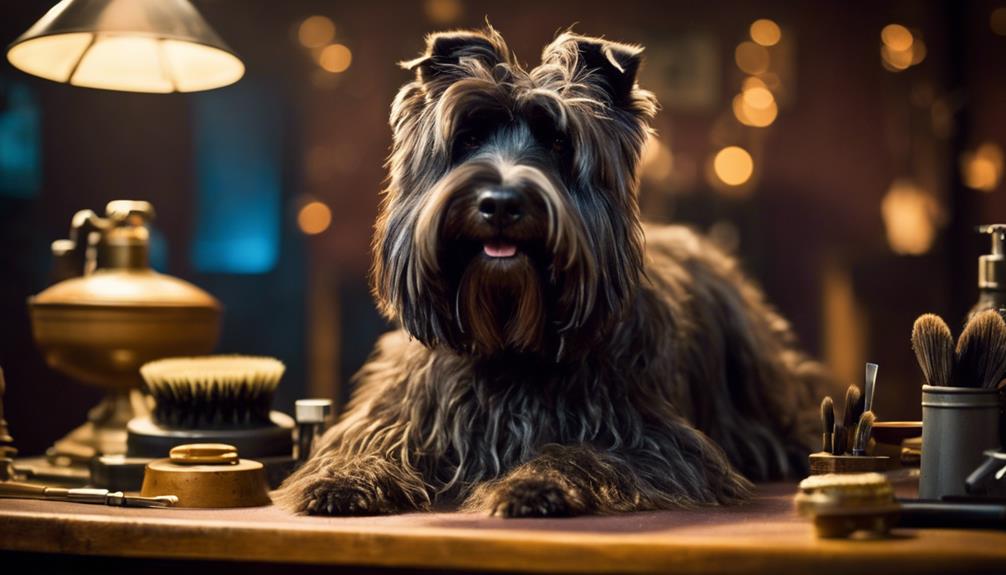
Grooming the Bouvier des Flandres requires attention to their medium-length, rough double coat to keep them healthy and looking their best. Their coat is special because it’s built to withstand different weather conditions. To make sure their coat stays in top shape and they look like the proud breed they are, there are a few key steps to include in their care routine.
Coat Care Basics: It’s vital to preserve the coat’s ability to protect against the weather. Regular grooming helps maintain this feature.
Brushing: Using the right tools and techniques to brush their coat regularly is essential. It helps prevent tangles and removes loose hair.
Bathing: Knowing how often to bathe a Bouvier des Flandres is important. Too much can strip away natural oils, but just enough keeps their skin healthy.
Haircuts: Keeping up with professional grooming appointments and doing some maintenance trimming at home are both important. It ensures they always look their best.
Coat Maintenance Essentials
Caring for a Bouvier des Flandres involves a dedicated grooming routine. Their dense, wooly coat needs regular brushing every week and professional trims to stay mat-free and clean. It’s crucial for their overall health and appearance. Tackling tangles early and removing loose fur, especially when they’re shedding more, keeps their coat in top condition.
Getting their coat professionally trimmed a few times a year is not just about looks. It helps keep the dog comfortable and supports good hygiene. Regular grooming helps spread the dog’s natural oils across their skin, preventing dryness and potential skin problems. For a Bouvier des Flandres, sticking to these grooming habits is key to their happiness and health.
Regular Brushing Routine
Maintaining a Bouvier des Flandres’ coat is crucial for their well-being. Their thick and shaggy coat needs regular grooming to avoid tangles and keep it looking its best. It’s important to brush their coat weekly using tools like a pin brush or slicker brush. These tools help manage both the undercoat and the outer coat effectively.
Regular brushing not only keeps the Bouvier’s coat in top condition but also helps in evenly spreading the dog’s natural oils across their skin and fur. This routine helps in removing loose hair and minimizes shedding. Beyond the practical benefits, grooming sessions offer a great opportunity to strengthen the bond between you and your dog, ensuring their coat remains tidy and healthy.
Bathing Frequency Tips
For healthy skin and fur, Bouvier des Flandres dogs should have a bath every 6-8 weeks. It’s best to use a mild dog shampoo that’s right for their coat to avoid irritating their skin. Keeping up with grooming and brushing regularly helps get rid of dirt, fur, and debris. This means they won’t need baths as often because it keeps their coat’s natural oils intact.
Paying extra attention to their beard and mustache is key to avoid knots and food getting stuck. It’s also crucial to dry them well after their bath to avoid any skin problems. This approach to bathing, as part of their overall grooming, helps keep the Bouvier des Flandres looking their best while keeping their skin and coat healthy.
Trimming and Clipping
Regular maintenance of the Bouvier des Flandres’ coat is crucial due to their dense double coat. Grooming them not only keeps their unique look but also prevents their fur from becoming tangled or matted. Weekly brushing is a must to keep their fur in good shape. However, to truly preserve their characteristic appearance, professional trimming a few times a year is advisable.
Using the right grooming tools like slicker brushes, combs, and clippers is key to maintaining the health and cleanliness of the Bouvier des Flandres’ coat. This grooming routine not only helps in reducing shedding and keeping bad smells at bay but also prevents skin problems. Additionally, it’s an excellent chance to check the dog’s skin for any issues, ticks, or parasites, ensuring their health and safety.
Ear and Nail Care
Caring for a Bouvier des Flandres’ coat is just the start. Ear and nail care are also critical for their health and comfort. You should check and clean their ears weekly to prevent infections. The thick fur in their ears can trap dirt and moisture, making infections more likely. So, keeping their ears clean is a must.
Nail trimming is another task that can’t be ignored; it should be done every 2-3 weeks. Long nails can lead to pain, difficulty walking, and even affect the dog’s bones. Getting your Bouvier used to regular grooming, including ear and nail care, from a young age is key. It makes the process smoother for both of you and helps keep them healthy.
Dietary Recommendations
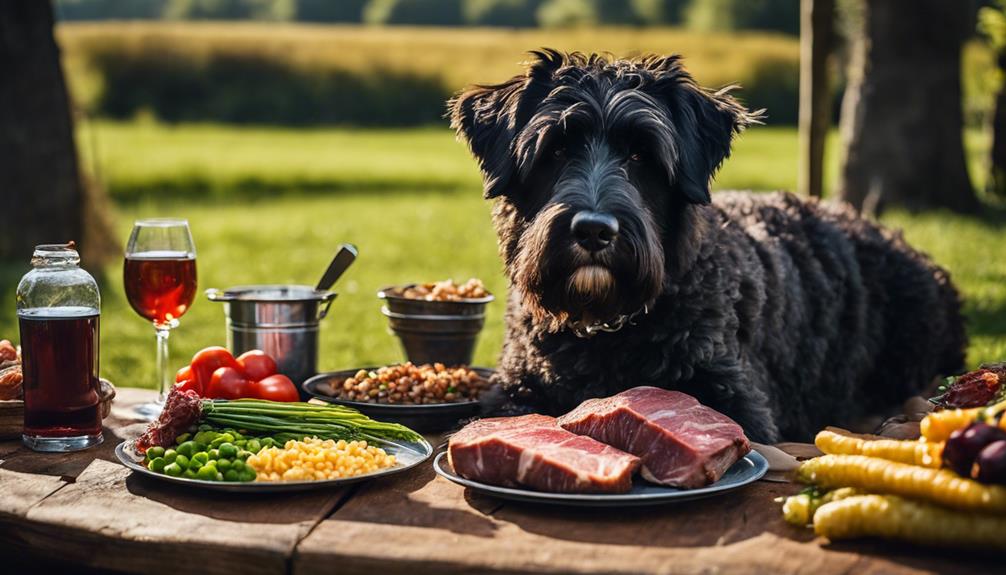
Creating a balanced diet for the Bouvier des Flandres involves understanding and meeting the dog breed’s unique nutritional needs. It’s crucial to pick the right kind of food and control how much they eat to keep them healthy and energetic. Getting advice from a vet can help tailor a diet that benefits the Bouvier des Flandres throughout its various stages of life.
- Nutritional Needs: Knowing what nutrients are essential
- Food Choices: Selecting the best food options
- Portion Control: Keeping an eye on food amounts
- Vet Advice: Why a vet’s input matters
For the Bouvier des Flandres, a diet that includes high-quality protein and fats, along with the right balance of carbohydrates, vitamins, and minerals, is key. Options like dry kibble designed for large breeds, canned food with high meat content, and possibly some vet-approved human foods can make good choices.
Controlling how much your Bouvier des Flandres eats prevents obesity and related health issues. Regular check-ups with a vet are important. They can offer personalized dietary advice, considering your dog’s age, weight, and health status.
Nutritional Needs Overview
To ensure a Bouvier des Flandres stays healthy and full of energy, their diet needs a good mix of proteins, fats, and carbs. This mix should match their active lifestyle and specific health needs. Since they’re such active dogs, Bouviers need top-quality food that keeps up with their energy levels.
What they eat depends on their age, size, how much they move, and their overall health, so you should talk to a vet to get it just right. Keeping an eye on how many calories they eat is key to avoid obesity, which can lead to other health problems.
Making sure they have plenty of fresh water, especially after exercise or in warm weather, is also critical. If your Bouvier has special dietary needs or allergies, finding the right food is important, and a vet can help guide you.
Recommended Food Types
Knowing what to feed a Bouvier des Flandres is key to their health. They thrive on high-quality, protein-rich dog foods that support their energetic lifestyle and help build strong muscles. It’s important to tailor their diet to match their size and activity level to ensure they get all the necessary nutrients.
Monitoring their eating habits is crucial, especially because they might have specific food sensitivities. Adjustments to their diet may be needed over time. It’s a good idea to work with a vet to create a diet plan that takes into account the dog’s age, weight, and any health issues. This helps prevent weight gain and related health problems, keeping your Bouvier des healthy and happy.
Managing Portion Sizes
Managing a Bouvier des Flandres’s diet is key to keeping them healthy and avoiding weight-related issues. These strong dogs usually need about 2-3 cups of quality dog food each day, split into two meals. It’s crucial to adjust these amounts based on the dog’s age, size, how active they are, and their metabolism to prevent health problems.
Overeating can lead to obesity and related issues like joint problems. It’s a good idea to talk to a vet to get the right food amounts for your Bouvier des Flandres.
Keeping an eye on the dog’s weight and body condition is also critical for adjusting food portions correctly, ensuring they stay in great shape.
Frequently Asked Questions
Is Bouvier Des Flandres a Good Family Dog?
- Moderate grooming keeps the coat healthy.
- Daily exercise maintains their energy level.
- Gentle temperament makes them great with kids.
How Much Does a Bouvier Des Flandres Cost?
- Prices range from $1500 to $2500, depending on breeder and location.
- Owning a Bouvier Des Flandres includes ongoing vet and vaccine costs.
- Healthcare expenses are part of the long-term ownership budget.
Is a Bouvier a Smart Dog?
- Bouviers excel in learning new commands quickly.
- They show great problem-solving ability.
- Their training versatility stands out.
Can Bouvier Des Flandres Be Left Alone?
- Dogs need time to adjust to being alone.
- Adequate exercise and play prevent negative behaviors.
- Mental stimulation keeps dogs happy when solo.

